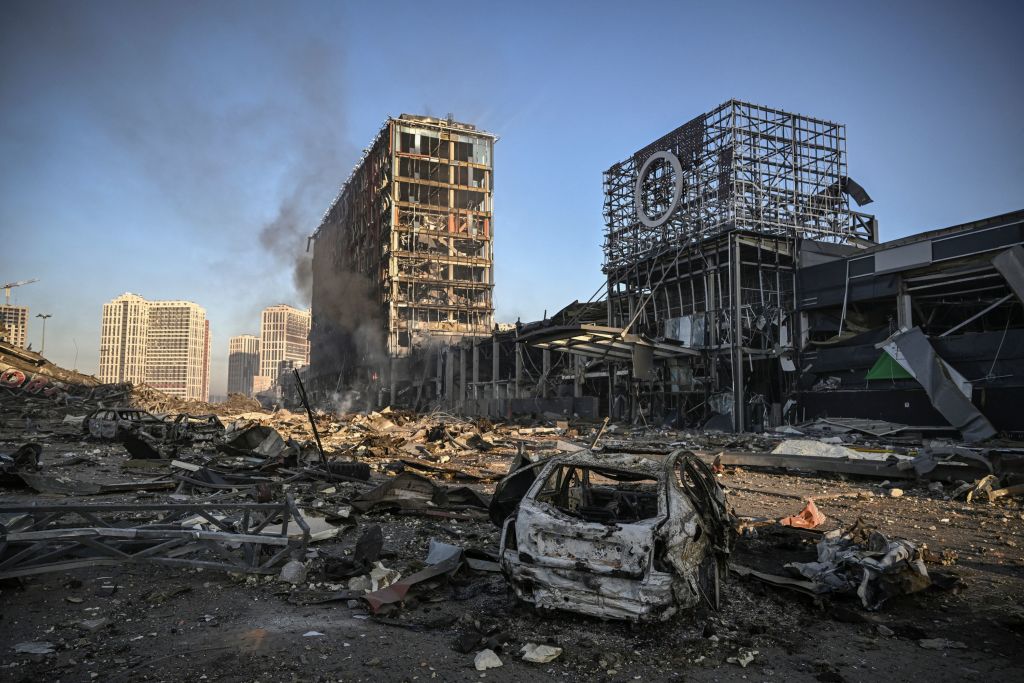Making Russia pay to rebuild Ukraine won’t be easy
Posted By Robert Wihtol on May 27, 2022 @ 06:00

In the three months since its tanks rolled into Ukraine, Russia has caused massive death and destruction and triggered a humanitarian crisis of unprecedented proportions. It has razed urban infrastructure and housing, laid waste to industrial facilities, impaired agricultural production and exports, and seriously damaged Ukraine’s transport and energy infrastructure.
Recent estimates put the cost of reconstruction at US$600 billion [1]. Depending how long the war lasts, the final figure could easily exceed US$1 trillion. Ukraine’s economy has been devastated. The World Bank estimates that this year it will shrink by 45% [2]. Even as the war continues, it’s clear that the task of reconstruction will be enormous.
Who will pay? The European Union recently disbursed €600 million (US$632 million) in soft loans to meet the most urgent needs and plans to provide a further similar amount by the summer, and the International Monetary Fund has approved US$1.4 billion in emergency financing [3].
At a conference held in Warsaw in early May, international donors led by the EU laid the foundations for a Marshall Plan–like trust fund [4], pledging US$6.3 billion to support Ukraine’s humanitarian and reconstruction needs. The World Bank, the IMF and the European Bank for Reconstruction and Development are also expected to provide financing and technical support.
Even these funds together, however, are dwarfed by Ukraine’s reconstruction needs. The long-term costs of rebuilding the country will be colossal, and the process will take years, or decades.
The war was instigated by Russia and was unprovoked. There is therefore a general expectation in the West that Russia should foot the bill. Putting in place the mechanisms to tap Russian assets, however, is fraught with political and legal challenges.
Several ideas have been floated, but without much detail. Western nations and others will need to reach broad political agreement on their approach and work out the thorny details. They may also need to enact supporting legislation.
The most commonly proffered proposal is to liquidate the assets of Russia’s oligarchs and put the proceeds in a reconstruction fund. This idea is attractive mainly because of the visibility of the assets but is legally hard to implement. The assets lie in many jurisdictions and would need to be confiscated and sold through due process, with adequate proof of their illegal origin. Property rights would need to be protected. Simply being Russian and rich should not be grounds to have your wealth confiscated.
Few countries have legislation that allows for the quick seizure and sale of oligarchs’ wealth. The exception is Italy, whose tough anti-mafia laws might serve as a model [5]. Four US senators have already initiated an ‘assets seizure for Ukraine reconstruction bill’ [6] that would enable the US government to take control of oligarchs’ assets. However, the funds obtained would at best cover a fraction of Ukraine’s reconstruction needs.
Tapping Russia’s frozen foreign reserves is attractive but legally problematic. European and US authorities have frozen about US$300 billion of Russian reserves held in euros and dollars. That would help significantly to bridge the funding gap.
There are several recent precedents for freezing a country’s reserves, as a temporary measure. These include Iran, Venezuela and Afghanistan. However, foreign reserves are the property of the concerned central bank and enjoy strong protection under international law [7]. Russia’s frozen reserves remain the property of its central bank, and confiscating them to fund Ukraine’s reconstruction would be legally and politically controversial [8]. And as long as the reserves remain frozen, they can be used as a bargaining chip with Moscow.
The EU high representative for foreign policy, Josep Borrell, has indicated that he supports using Russia’s reserves [9]. He refers to the precedent set by the US taking partial control of Afghanistan’s reserves. Of the EU countries, Poland has been the most vocal in supporting the notion that Russia should pay. EU officials are looking into the matter but have not proposed specific action.
US Treasury Secretary Janet Yellen has indicated that she does not take the matter lightly [5], that such a move would need to be coordinated with America’s allies, and that new legislation might be required. When Russia’s reserves were originally frozen, China was strongly opposed [10]. It is clearly concerned that the precedent set by the move could leave its own enormous reserves at risk.
Prior to the war, Ukraine was no economic paragon. It was endemically corrupt, with weak rule of law and lax regulation of state entities. Ukraine inherited many of the problems of the Soviet system, including poor-quality and ageing infrastructure. In due course, the reconstruction effort will provide an opportunity not only to rehabilitate physical and social assets but to reform Ukraine’s economic policies and institutions.
As the conflict drags on, it is turning into a war of attrition. It may eventually become a frozen conflict. Any sustainable reconstruction effort would require a high degree of stability, which is not yet on the horizon. Before that, however, the details for financing the reconstruction need to be hammered out. The task is complex and should be tackled without delay.
Article printed from The Strategist: https://www.aspistrategist.org.au
URL to article: https://www.aspistrategist.org.au/making-russia-pay-to-rebuild-ukraine-wont-be-easy/
URLs in this post:
[1] US$600 billion: https://www.wsj.com/livecoverage/russia-ukraine-latest-news-2022-05-03/card/zelensky-estimates-cost-of-rebuilding-ukraine-at-600-billion-oP04eAen6xsQHqiJK8rE
[2] 45%: https://www.worldbank.org/en/news/press-release/2022/04/10/russian-invasion-to-shrink-ukraine-economy-by-45-percent-this-year
[3] emergency financing: https://www.bloomberg.com/news/articles/2022-04-19/europe-expects-to-pay-bulk-of-ukraine-s-reconstruction-costs#:~:text=The%20European%20Union%20is%20planning,the%20bulk%20of%20the%20costs.
[4] Marshall Plan–like trust fund: https://asia.nikkei.com/Editor-s-Picks/Interview/EU-urges-Japan-to-support-Marshall-Plan-for-Ukraine
[5] anti-mafia laws might serve as a model: https://www.ft.com/content/91ffdd88-fa02-4ae2-931d-f47f042e9ed4
[6] assets seizure for Ukraine reconstruction bill’: https://www.congress.gov/bill/117th-congress/house-bill/6930
[7] strong protection under international law: https://monardlaw.be/en/stories/freezing-assets-of-foreign-central-banks-in-international-law-again-in-the-spotlight/
[8] legally and politically controversial: https://www.ft.com/content/bdf5c55e-79d6-45be-8288-72e0c7a9a565
[9] supports using Russia’s reserves: https://www.ft.com/content/82b0444f-889a-4f3d-8dbc-1d04162807f3
[10] China was strongly opposed: https://www.ft.com/content/45d5fcac-3e6d-420a-ac78-4b439e24b5de
Click here to print.